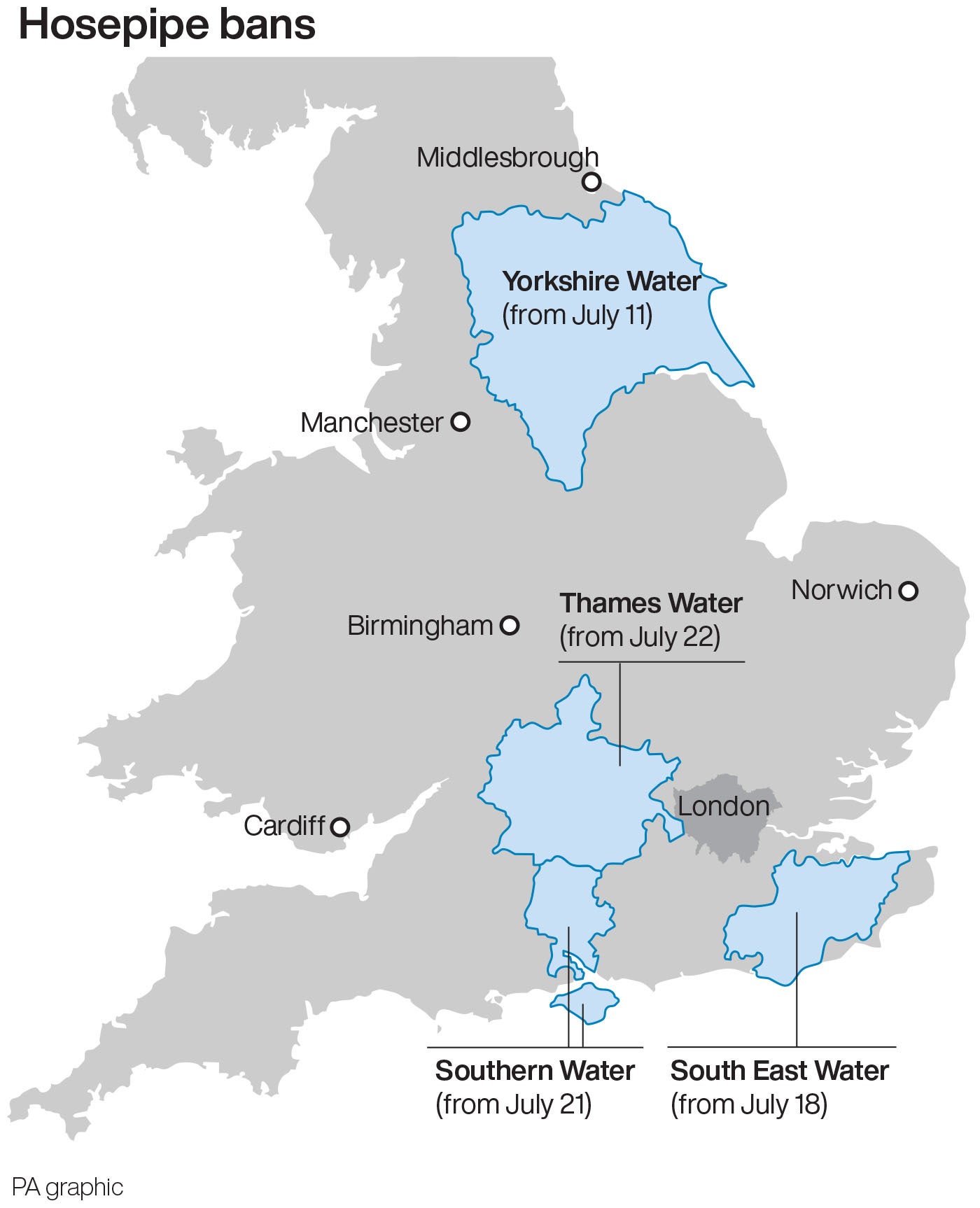Major water companies in England have not issued a single fine to residents for breaking hosepipe bans over the last five years, The Independent can reveal.
Southern Water, Yorkshire Water, Thames Water and South West Water have confirmed they did not issue any fines, which can be as high as £1,000, despite having the legal power to do so for more than a decade.
All four companies have introduced hosepipe bans at different times since 2020, including the heatwaves of 2022 and 2023, which left millions under restrictions.
This year, Yorkshire Water, South East Water, and Southern Water have all imposed bans to curb non-essential use as England battles exceptionally dry weather.
Under current rules, householders who breach a ban can be fined up to £1,000 if prosecuted, and companies also have powers to issue £100 fixed penalty notices.
Despite high-profile campaigns urging households to save water, enforcement has relied entirely on public goodwill rather than financial penalties.

Campaigners have told The Independent that leaking pipes, poor planning and inaction by water companies pose a far greater threat to supplies than people watering their gardens.
James Wallace, CEO of campaign group River Action, said it was wrong to focus on “threatening customers with £1,000 fines for watering their gardens” when water companies themselves spill billions of litres every day and face few consequences.
“Voluntary measures and public awareness aren’t enough,” he warned, calling for “real enforcement, aimed at water companies, and bold structural reform” to tackle worsening drought risks.
“No new reservoirs have been built in over 30 years, despite clear climate warnings about worsening droughts,” Mr Wallace added.

Paul de Zylva, sustainability analyst at Friends of the Earth, said that hosepipe bans are a “sticking plaster solution to a problem that is only going to get worse”.
“Recent heatwaves only add to drought conditions, making it harder for everyone – not least hospitals, care homes, farmers and transport operators – to cope,” he added.
It comes as the government announced plans to scrap the regulator Ofwat in an overhaul of regulation for the troubled water sector.
The final report from the Independent Water Commission, led by Sir Jon Cunliffe, made 88 recommendations to the UK and Welsh governments aimed at turning around the industry, which has faced public fury over pollution, soaring bills, shareholder payouts and executive bonuses.
The number of serious pollution incidents caused by water firms across England also rose by 60 per cent in 2024 compared with the previous year, the Environment Agency said.
Three water firms were responsible for 81 per cent of these serious incidents – Thames Water with 33, Southern Water with 15, and Yorkshire Water with 13.
It attributed the rise in incidents last year to persistent underinvestment in new infrastructure, poor asset maintenance, and reduced resilience because of the impacts of climate change.
Southern Water said that during its 2022 hosepipe ban, most customers complied voluntarily. The company said it focused on explaining the reasons for the ban and encouraging people to comply, viewing enforcement as the “very last step”.

Yorkshire Water also confirmed no fines had been issued.
A spokesperson said: “Whilst we do have the power to enforce the restrictions and have a process to deal with those breaching it, we would prefer not to have to use this and would hope customers would work with us and respect the restrictions, recognising it’s been put in place to protect essential supplies. The response so far has been brilliant, and we’ve seen demand coming down.”
South West Water and Thames Water both confirmed they did not fine customers for breaching restrictions.
Nicci Russell, chief executive of water efficiency charity Waterwise, said: “At Waterwise, we are clear that the UK is running out of water, and that this will affect every aspect of our lives.”
She added that even if water companies fixed all their leaks, “there would still be a big gap between the water we have and the water we need”.
Ms Russell said hosepipe bans remain a legitimate tool to manage demand but argued the most effective solution is for everyone to “waste less water, now”, alongside considering whether ministers should introduce stronger legal powers over time.
Department for Environment, Food and Rural Affairs (Defra) officials said hosepipe bans typically reduce water use by around 3 to 5 per cent, helping supplies last longer and protecting the environment.
Defra encourages households to take steps to save water, such as fixing leaky toilets, installing water butts and reusing leftover water for plants.







